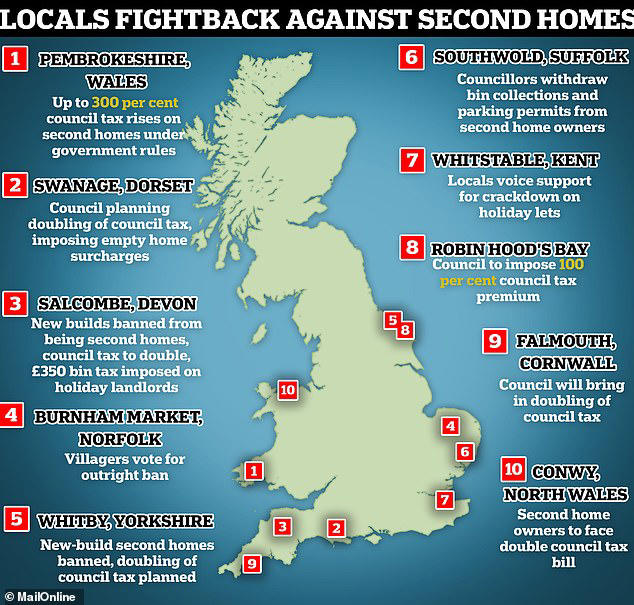Owners of empty homes will pay double council tax after 12 months under Government plans - but grieving families will now get a year's grace.
The Government is shaking up how council tax works to cut down on the number of second homes and those left empty for long periods. The issues of second homes and vacant properties have sparked anger in regions such as Devon, Cornwall, Norfolk and parts of Wales.
Many residents feel their regions are suffering from an influx of holiday homes that are empty for much of the year, hollowing out communities and causing house prices to rise.
Empty houses to pay double council tax after a year in second home crackdown
© Provided by This Is Money
The Department for Levelling Up, Housing and Communities (DLUHC) has now announced tweaks to the second homes council tax premium, which lets local authorities double this tax on eligible homes. The DHLUC said it would allow councils to charge double council tax on properties after 12 months of being empty, down from two years currently.
But it will also remove inherited properties from double council tax for as much as 12 months, to be kinder to grieving families. The strengthened empty homes premium will come into effect from April 2024.
However, each council must wait at least a year before bringing the extra charges in, so the earliest it will happen is April 2025. The exemption for inherited properties will also apply from April 2025. The extra money raised will go to local authorities, who can spend it as they like. The changes will only apply in England.
"Long-term empty properties are shutting local families and young people out of the housing market" said Simon Hoare, a local government minister.
The second home premium already applies, having been made law in October 2023 with the passing of the Levelling Up and Regeneration Act. But the Government wanted to fine tune the rules and canvass opinion, so consulted on the issue too.
The Government response to its consultation said "Large numbers of empty homes can contribute to housing supply pressures, whilst also reducing the desirability of local areas. Second homes can provide flexibility to enable people to work in and contribute to the local community, whilst being able to return to a family home in another part of the country on a regular basis. However, large concentrations of second homes reduce the size of the permanent population, which can lead to local services becoming unsustainable."
Local government minister Simon Hoare added "long term empty properties are shutting local families and young people out of the housing market as they are being denied the opportunity to rent or buy in their own community. So, we are taking action as part of our long-term plan for housing. That means delivering more of the right homes in the right places and giving councils more powers to help give local people the homes they need."
Almost all local authorities are planning to increase their council tax by 4.99% from April 2024.
The Government also abolished tax perks for properties rented as holiday homes in the recent Budget, claiming that the measure would help those seeking affordable properties to rent and buy.
Generation Rent: homeless data shows “whole new level of horror in this sector”
Activist group Generation Rent has described the latest homelessness data from the government as showing “a whole new level of horror.”
It claims that ,ore people were made homeless in England than bought their first home in the 12 months to 30 September 2023, the data just released. The group says this is the first time that this has happened since records began and reveals "a shift to a whole new level of horror" in the housing system.
Some 126,100 households bought a home in the 12 months to 30 September 2023 according to government Stamp Duty Land Tax statistics. This was down from 264,400 in the 12 months to 30 September 2022.
In the same period 164,630 households were made homeless, being owed a homelessness relief duty from their council, according to statutory homelessness statistics published this week. This is up from 148,110 in the 12 months to 30 September 2022.
Ben Twomey - chief executive of Generation Rent - says "the housing system has been in crisis for many years, but these latest figures reveal a shift to a whole new level of horror. Instead of helping people get on in life, the housing system is now hauling us backwards. The government must face down vested interests who are blocking progress and act more decisively to protect tenants from unfair evictions while building the homes we need to lead the lives we want."
And Matt Downie - chief executive of homelessness charity Crisis - adds “the scale of rough sleeping is now a source of national shame. It is a sign of extreme inequality and must prompt a rethink at the highest levels of government. It cannot be overstated how dehumanising sleeping on the streets is. Through our frontline services we hear directly from people who have been spat at, urinated on or attacked simply because they do not have the security of a safe home. Things have got to change. To bring these numbers down, we urgently need the Westminster government to put long-term funding into the proven solutions we know help people to leave the streets behind, such as Housing First. But crucially, we also need to see a complete change in approach and a commitment to build the levels of social housing we need every year. By taking these steps we can start to bring these numbers down and, most importantly, ensure that people get the security of a stable home.”


